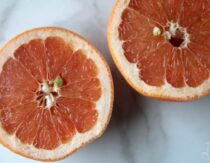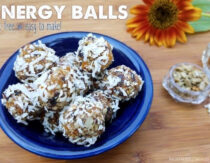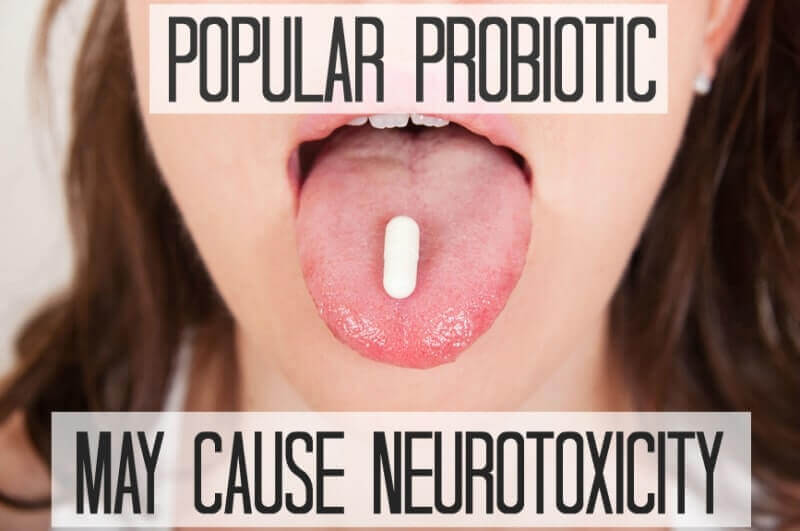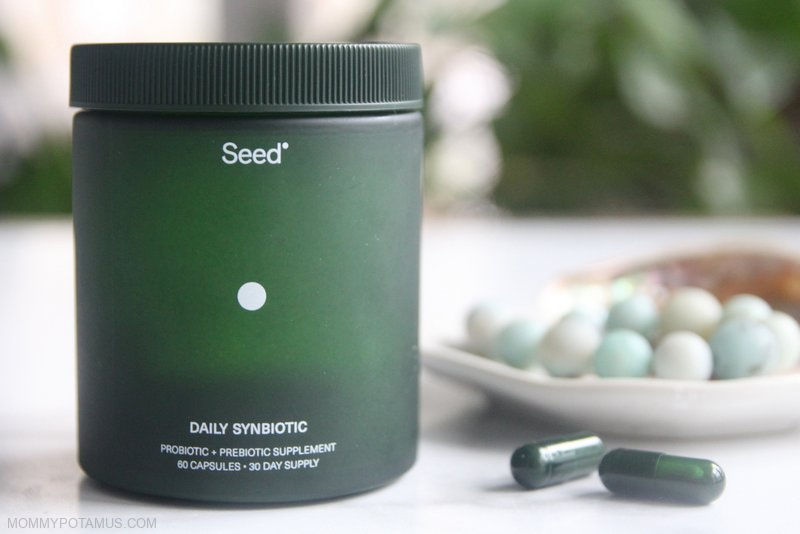
What happens when you combine a brilliant mom, a scientist, and a team of experts in fields like microbiology, immunology and transcriptomics . . . including the guy who literally coined the word “probiotics”? The answer, of course, is Seed’s Daily Synbiotic.
It’s no secret that probiotics benefit so much more than just gut health. They directly interact with our immune cells, make vitamins and beneficial metabolites for us, support skin health, a healthy cardiovascular system, and more.
In fact, the microorganisms that make up our microbiome contain so much rich, synergistically interactive genetic material that they’re often called our “second genome.” Like our first genome – DNA – our microbiomes are all completely unique. However unlike DNA, they’re constantly changing.
Though it was once thought that most beneficial bacteria “recolonize” our digestive tracts and then stay put, we now know that they’re mostly skilled workers that perform a very specific job and then move on. (1) That’s why in addition to consuming lots of fermented foods, I also regularly take Seed Daily Synbiotic. (Prebiotic + Probiotic = Synbiotic)
Why both?
If you’re wondering “why both fermented foods and a probiotic supplement?” . . . . here are a couple of reasons:
Consistency – Even though I try to eat fermented foods everyday, I often pause fermenting when life gets busy.
Precise Strains & Potency – With a few exceptions, like when you use a specific probiotic as a starter for homemade coconut yogurt, the microbes in fermented foods are wild and the exact strain is unknown.
No doubt many of them have benefits that have not been discovered yet, but the upside of probiotic supplements (at least the good ones) is that they contain precise strains that are not just neutral or somewhat helpful, but have profound benefits for human health. Also, they contain those strains in large enough amounts to create a benefit.
We’ll dive into why I love Seed in just a moment, but first I want to mention that none of these statements have been evaluated by the FDA, this article is not medical advice, and it is not meant to diagnose or treat any condition. Please talk with your healthcare provider about any supplements you are considering. Now that we’ve got that out of the way, let’s dive in.
3 Reasons I Love Seed
There are SO MANY tips for supporting wellness out there . . . more than any person can actually do in a day. That’s why I opt for the highest impact practices that I can easily incorporate. Because gut health has such an impact on overall health, probiotics are on my short list of priorities.
Over the years I’ve bounced around between several probiotics as I read up on different strains and benefits. And while I still may incorporate a different strain here or there to address a specific goal, I love Seed because it incorporates a broad set of strains that cover a lot of bases, and unlike some of the ones sold on store shelves I’m confident in its viability and potency.
Here’s why, plus one more reason that I’m so happy to support them:
1. Rooted In Solid Research
Seed’s Chief Scientist, Dr. Gregor Reid, is literally the guy who coined the word “probiotic.” In addition, their Scientific Advisory Board is made up of scientists, researchers, doctors and authors across the fields of microbiology, immunology, genetics, metabolomics, gastroenterology, pediatrics, molecular biology, and transcriptomics.
They lead labs, teach at world-renowned academic institutions, and have among them 2800+ publications and over 140,000 citations in peer-reviewed scientific journals and textbooks. They know their stuff, and it shows in the way their synbiotic is formulated.
2. Commitment To Purity & Potency
Seed’s Daily Synbiotic the only probiotic to undergo whole-genome testing, which means they know exactly which strains are present, and in what ratios. They monitor purity with over 50 quality assurance and quality control checkpoints throughout production.
While some manufacturers use skip-lot testing, which basically means spot-checking a few raw materials here and there, Seed tests ALL their ingredients and every batch after it is manufactured.
Also, they ensure potency by:
- Running their synbiotic through Simulator of the Human Intestinal Microbial Ecosystem (SHIME®) studies. SHIME is basically the most accurate GI simulator we have in terms of understanding what will reach the gut alive.
- In addition to measuring colony-forming units (CFUs), they also test for active fluorescent units (AFUs), which is a more accurate way to measure potency.
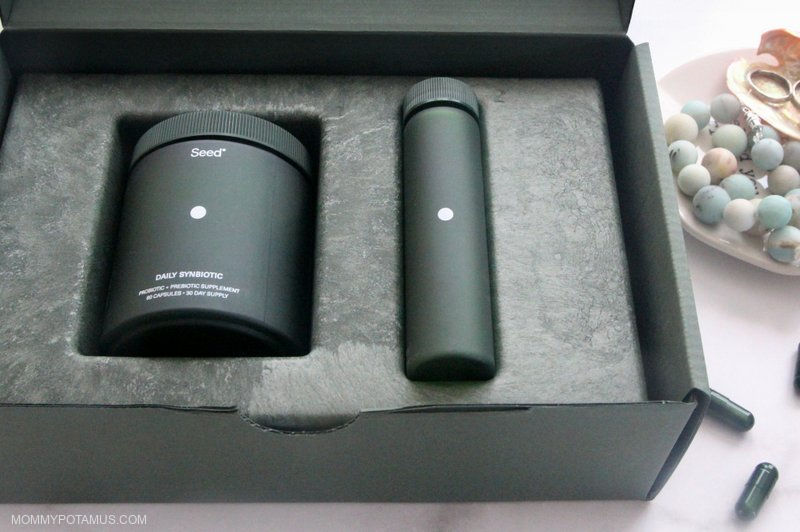
3. Passionate About Sustainability
When my welcome kit arrived a year or so ago, it contained a refillable glass jar and free glass travel vial tucked into a biodegradable paper. The delivery box is recyclable, and now I receive small monthly packets to refill my jar with so that there’s as little waste as possible.
It’s not just about sustainable materials, though. Seed Labs is a research-arm of their company that is currently working on projects like a probiotic for honeybees that helps protect from Colony Collapse Disorder (CCD). Bees are declining worldwide, and that’s a huge problem because:
“It is estimated that about one-third of global food production requires animal pollination and that 80–90 per cent of this role is carried out by honeybees.” (2)
They’re also researching ways to degrade polyethylene (the stuff disposable shopping bags are made of) using plastic-eating bacteria. I love supporting a company that is taking on these kinds of projects.
So, what’s In Seed’s Daily Synbiotic?
Seed incorporates a broad spectrum of probiotic strains (24 to be exact) which support human health, but before we talk about what’s included let’s cover what’s NOT.
Seed Synbiotic is free of common allergens like:
- Gluten
- Dairy
- Soy
- Corn
- Preservatives
Now that we’ve got that out of the way, here are the ingredients:
Ingredient #1 – Probiotics
Because strain matters, and so does potency, Seed publishes exactly what strains are in their formulation. They alsouse the same dosage range that has been shown to deliver a benefit in human studies. Here’s what their 24-strain blend includes:
Digestive Health, Gastrointestinal Immunity & Gut Barrier Integrity Blend
The Daily Synbiotic includes 17 research-backed strains that specifically support digestive health by helping to:
- Maintain regularity, ease bloating, and potentially alleviate occasional constipation and discomfort associated with increased intestinal transit time.
- Support healthy gut barrier function and integrity. That’s important because the gut barrier part of our innate immune system, which works to keep microbes from entering our whole body. According to the U.S. National Library of Medicine, “These barriers form the first line of defense in the immune response.” (3)
- Facilitate healthy “cross-talk” between immune and intestinal cells while increasing the production of beneficial short-chain fatty acids like butyrate.
Dermatological Health Blend
This blend includes 5 strains that promote healthy skin (in terms of qualities like clarity and smoothness) while supporting the gut-skin axis. If you’ve never heard of it before, the gut-skin axis describes the unique relationship between our primary internal barrier from pathogens (the gut) and our primary external barrier (the skin).
They “talk” a lot, and the vibrancy of one influences the other.
Cardiovascular Health Blend
Seed Synbiotic contains 3 research-backed strains that promote heart health, support intestinal recycling of cholesterol and bile, and help to maintain healthy blood cholesterol levels that are already in the normal range.
Micronutrient Synthesis Blend
Also included are 2 research-backed strains that support folate production (vitamin B9) and the synthesis of vitamin B12 in Simulator of the Human Intestinal Microbial Ecosystem (SHIME®) studies. As I mentioned earlier, SHIME is basically the most accurate GI simulator we have.
Ingredient #2 – Prebiotics
More than just food for beneficial bacteria, prebiotics contain compounds that interact with probiotics to make beneficial byproducts in the gut. One of these metabolites, butyrate, is a short-chain fatty acid (SCFA) that strengthens the mucosal barrier lining of the gut.
As I mentioned earlier, a strong gut barrier is part of our “first line of defense” because it helps to better keep pathogens contained, and it assists with nutrient absorption, too.
Seed uses nested capsules that are designed to survive the harsh environment of the stomach. The inner capsule is filled with beneficial bacteria, then wrapped an outer capsule that’s filled with a powdered prebiotic made from phenolic-rich Indian pomegranate. The outer capsule is made from a chlorophyllin exterior that works with the pomegranate to shield the bacteria from oxygen, moisture, heat, and stomach acid.
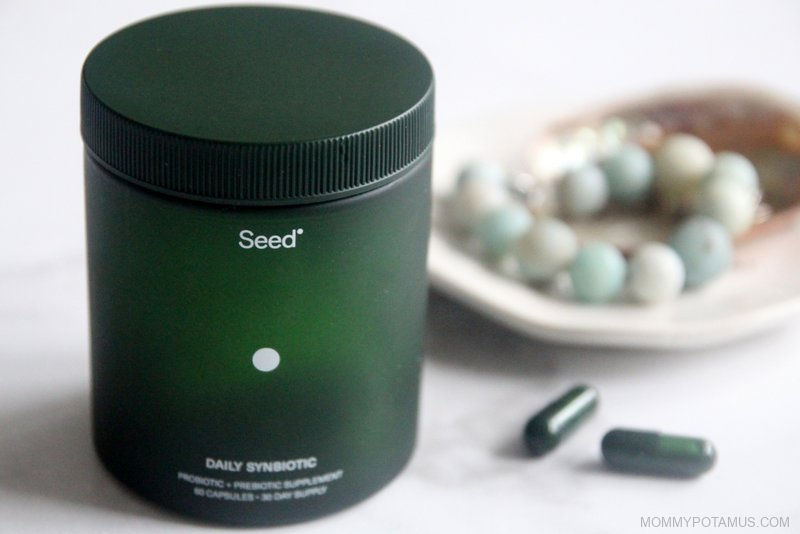
Want to try Seed’s Daily Synbiotic?
Click here and use MPSAVE15 for 15% off your first month.
Want more research-backed natural remedies?
No problem, I’ve created a free ebook for you – Kitchen Apothecary: 25+ Natural Remedies Using Ingredients From Your Pantry – as a gift for signing up for my newsletter. You’ll also get updates when I post about safe essential oils for pregnant/breastfeeding mamas, exclusive gifts and coupons (I was able to give away a jar of free coconut oil to anyone who wanted it recently!), plus other goodies.
Sign up using the form below.
Click here and use MPSAVE15 for 15% off your first month.
Sources
1. Wieërs, Grégoire (2020) How Probiotics Affect the Microbiota
2. Australian Academy of Science. We need bees for more than honey
3. U.S. National Library of Medicine. Immune Response

